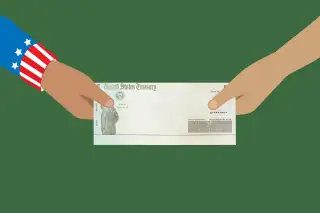True or False: You Won't Get a Stimulus Check if You Owe Money to the IRS

A little extra cash could be just what you need to pay off some debt. But in these tough times, you might find that your stimulus check could be better spent on necessities, like groceries or rent.
These checks, up to $1,200 a person plus $500 per dependent are owed to most Americans as a result of the coronavirus stimulus package passed by lawmakers last month. But what happens to that sum if you owe the government money?
What if you owe the government?
If you're in debt to a federal agency, like the Internal Revenue Service, rest assured that you’ll still receive your stimulus check in its full amount. The government won’t use this opportunity to recoup the money you owe, per language in the CARES Act stimulus law (see: "(d) EXCEPTION FROM REDUCTION OR OFFSET").
The same goes for debt owed to the state government, with one major exception: child support.
“Theoretically, state governments could garnish rebates for back state tax owed, but the Treasury Department has clarified that they will only be collecting rebates for child support owed,” says Garrett Watson, a senior policy analyst at the Tax Foundation.
The CARES Act gives the Treasury department the freedom to lawfully mandate exceptions. And, according to the Treasury, anyone who currently owes child support will see that amount taken out of their stimulus check, up to the full amount allocated to them. States must report any collections owed to the state Treasury Offset Program — set up by the U.S. Treasury — so any necessary adjustments can be made to your check amount. Here are a few useful notes on the terms, per the Treasury Offset Program page:
- No exceptions can be made for financial hardships
- If you’re filing jointly with someone who owes child support, you can file an injured spouse form here
- If have any questions about any debt that’s been reported to the program, you can reach the Treasury Offset Program at 800-304-3107
What if you owe your bank?
If you don't owe child support, there's still one collector you should be wary of: your bank.
Banks are private debt collectors, which — unlike federal and state debt collectors — haven't been asked to stand down by either the CARES Act language or the Treasury. And since the stimulus check is technically a tax credit as opposed to a federal benefit, the bank is within its rights to dip into your money the second it's deposited into your account.
"There’s nothing in the law that precludes that action," Ronda Kent, the chief disbursing officer with Treasury’s Bureau of the Fiscal Service, told banks in audio shared by the Prospect.
If you owe your bank money (say, in overdraft fees or an outstanding loan), go to the Internal Revenue Service's Get My Payment application to check on the status of your money or to try and update your delivery information.
If you've already filed your 2019 tax return and it includes your direct deposit information, you're out of luck since there's no changing your banking information now — your stimulus check will be deposited in the account you specified. But if you haven't filed your 2019 tax return yet, now's your chance to change your banking information: file your taxes, and use a bank account that isn't compromised by debt.
Best case scenario, you're getting a check in the mail instead of a direct deposit, in which case you should cash it out or deposit the physical check elsewhere. But that would only happen if you don't file income taxes at all, or if you have filed and have gotten past refunds via paper check.